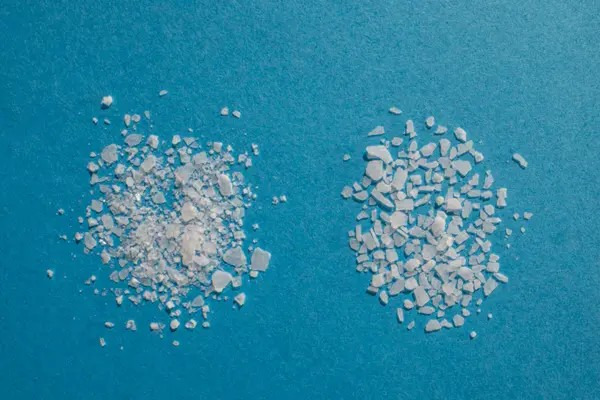I cooked primarily with Diamond Crystal coarse kosher salt for years. Then sometime in the past year or two it started trending and disappeared from all store shelves for several months, and then when it returned it was in a redesigned box and at a higher price point. (Background here https://www.nytimes.com/2023/08/01/dining/diamond-crystal-kosher-salt.html.) Official line is that the product is unchanged, but it seems to have a more flakey texture than before, and I swear to god it’s no longer the “less salty salt” alternative it used to be. (I’m an experienced cook, usually don’t measure salt or spices, and now the habits that have served me well for years seem to render a lot of dishes too salty.) Am I crazy, or is there something fishy going on?
I think it’s probably just good strategic marketing. Many internet and TV popular chefs and food writers/bloggers have recommended it for a while. Using salt that is consistent with the recipes is important when using volumetric measurements. So, with more customers
(us) being influenced to purchase it, there is an opportunity to expand their margins and make more money on the product they developed years ago. Expanding profits is the name of the game for all of us.
It may be up in price a bit, but it’s still cheap. We go through a box about every year or so.
I haven’t opened the newest, redesigned box so I don’t have any comments on whether I find it different. Wouldn’t more flaky = less salt (NaCl)/volume and thus less salty if you maintained consistent measurements?
Interested to know why you like it? I have always gone with Morton’s Kosher, but couldn’t find it for a while and bought a box of Diamond Crystal and hated it. It’s very hard to control with my fingers. I ground it up into pickling salt in my food pro.
Morton’s kosher salt is much more dense than Diamond crystal. Many recipes will add an addendum if you are using Morton’s salt to use less.
Flaky is probably the wrong word. It seems less coarse (but still not quite fine table salt).
I used to like it due to what felt to me like a milder, less salty flavor than non-kosher or Morton salt. But I do feel like that has changed. Not a big deal to recalibrate how much salt to use in familiar dishes, but I am curious if I’m just imagining this or if they really have quietly changed the formula.
The Diamond Crystal 3 lb box (not sure about the new design) was much larger than the 3 lb Mortons box with the same amount of salt inside. Depending on which one you are used to using as your daily salt you will probably not be all that impressed with the other companies product. I was Diamond Crystal all the way until Covid when it became almost impossible to source or the premium for it just didn’t make any sense. Ended up getting a 22lb bag of Sale Marino Fino Trapani sea salt from Amazon for $29. If I was going to have to recalibrate to a different salt I figured I might as well go with this. Loving the salt and I won’t be needing more of it for quite some time. The fact that this sea salt was less than I could buy either of the other brands for just reinforced how overpriced salt has become.
If it’s a rub, or a garnish, then yeah, it makes a difference…
If the salt is dissolving in your recipe, “flakiness” is irrelevant; it’s gonna make a salt solution.
Weighing rather than scooping solids by volumes has been standard practice since the 16th century.
A digital kitchen scale recommended by the nyt for more than about 10g is here - $15
https://www.amazon.com/dp/B004164SRA/
if you want to weigh less than 10g with both precision and accuracy, you should spend another … $10
https://www.amazon.com/Gram-Digital-calibration-Conversion-Rechargeable/dp/B07Y9CXQTB
bang. if you wanna keep on freeballing “pinches” and “scoops”, have at it. there’s a reason why baking uses masses…
–
1 cup of Diamond Kosher Salt weighs 137 grams.
1 cup of Mortons Kosher salt weighs 241 grams.
Use approximately 1.75 Diamond to 1 Mortons for comparable saltiness.
use approximately .57 Mortons to 1 Diamond for comparable saltiness.
your link is broken. use this https://www.nytimes.com/2023/08/01/dining/diamond-crystal-kosher-salt.html?unlocked_article_code=1.B04.U98l.IPXoU7pPfvYR&smid=url-share
it’s exactly the same salt as before and because of reasons, it’s the default kosher salt used by professionals, food influencers, recipe writers, etc.
And this is precisely why I don’t like it. Morton is more consistent in size so it’s easier to get a heavy pinch and sprinkle it under control over the top of a large surface.

Alternatively, measure by mass, not volume, and you’ll never have to remember some esoteric conversation ratio again.
A thousand times this. If one cares enough to be me measuring their ingredients then one should be measuring by mass, not by volume.
One other factor to consider. They measured the “bounce” of the salt when it hit the food. This made a noticeable difference in the saltiness of the end product. Obviously for baking etc. I use a kitchen scale. But when I am salting meat/seafood for dry brining, I’m going with the grab the little scoop in my salt cellar and sprinkle like snow (as one chef stated).
I have gone as far as ordering a case through a local restaurant we frequent. The major irritation is as with all things inflationary. The same local store that sold it 5 years ago at $3.99 (Sam’s was $2.99 when they carried it) now carries it at $11.99. It makes me grimace and raises my blood pressure.
too much sodium is bad for hypertension!
good job you can’t afford salt!
If only most of my recipes used mass.
best trend in cooking / recipes is that most books and online resources do this natively. volume was always horrible.
i even salt to % now.